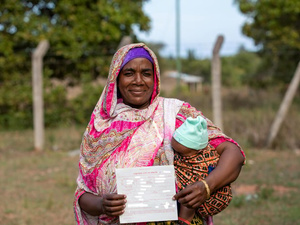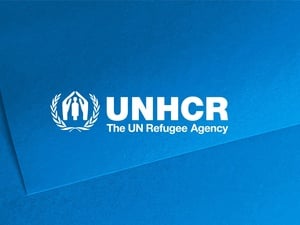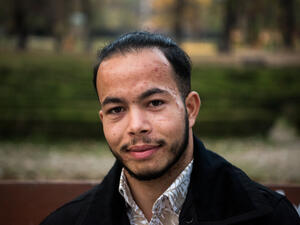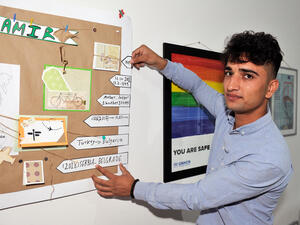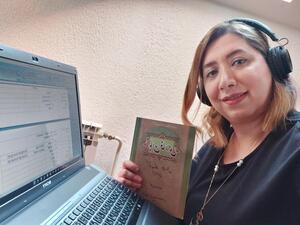Kosovo Crisis Update
Kosovo Crisis Update
Albania
A total of 192 refugees crossed the border at Morini on Friday. Most came on foot, though a few arrived by car. In a puzzling turn of events, one group of 60 refugees consisted only of men. They said that they and their families had been rounded up in their village of Petrova, near Prizren, by military authorities. In an account which cannot be independently verified, they told UNHCR staff that the women and children had been separated from the men, who were then put on a bus and driven to the border. The women and children remained behind.
UNHCR continued its efforts to transfer refugees away from the border area near Kukes. On Friday an estimated 3,000 refugees left Kukes for other prefectures on buses provided by the authorities and UNHCR.
Contingency planning by UNHCR and its partners for another large influx into the Kukes area is continuing. The availability of shelter remains the principal concern. The Emergency Management Group in Kukes, the main coordinating body, has agreed on action to tackle this problem: 49 buildings have been identified by local authorities, which, with some minor repair, can serve as collective centres. Meanwhile a team of Albanian, NATO and DFID (UK) officials will today begin an assessment of seven sites. If found suitable, UNHCR would ask NATO to set up emergency camps on those sites. Problems of land ownership and the high water table remain factors which complicate efforts to construct new camps.
The early provision of assistance to host families has also been identified as an essential element of contingency planning. If host families are to continue to accommodate refugees and to take in new arrivals, the international community must provide them with more support.
Over the past two days, a total of 41 planes carrying relief supplies arrived in Tirana. The ICRC has begun daily flights to ferry relief supplies to Bajram Curri, an area in northern Albania which has been plagued by insecurity and banditry. The ICRC will provide assistance to approximately 2,300 Kosovar refugees living there. An estimated 5,000 internally displaced Albanians are also believed to be in Bajram Curri, after having left their villages near the border with Kosovo.
Kosovars continue to cross into Albania from Montenegro on a daily basis. Many find temporary accommodation in and around Shkodra. Several thousand have continued onward to other parts of Albania. In addition, an unknown number of Montenegrins of Albanian origin have crossed into the Shkodra area.
Accommodation in Shkodra is severely limited and is quickly being filled with new arrivals. In one case, nearly 4,000 refugees are crowding into a tobacco factory with a capacity for less than half this amount. Sanitation in the factory is very poor. UNHCR is working to identify alternative sites to house refugees and is sending additional staff and relief supplies to the town. Basic food items are being distributed by UNHCR to refugees living in and around Shkodra and WFP is working to strengthen the supply chain between Tirana and Shkodra.
FYR of Macedonia
UNHCR staff had been trying all week to get access to the mountainous region between the Blace and Lojane, where refugees had begun to arrive nearly one week ago. Finally on Thursday a small UNHCR aid convoy was allowed into the area, and on Friday a team headed there to assess the needs of the refugees. They found that most of the refugees had dispersed after having arrived at the small village of Malina Mala. They found approximately 500 exhausted refugees, many staying in a mosque at the village of Lipkova, an 8 to 10 hour trek on foot from Malina Mala.
The refugees had arrived earlier Friday morning, many suffering from serious dehydration and in need of urgent medical care. Some of the children appeared to be unconscious, others were too exhausted to talk or even to eat. The refugees said that seven children and two elderly persons had died during their walk from Kosovo to Malina Mala a week ago. Snow and cold winds have aggravated an already bad situation. UNHCR urgently requested Médecins du Monde to dispatch a medical team. The refugees have reported that a further group of several hundred refugees are thought to be on their way to the village. A UNHCR team is returning to the area today to try to locate the other refugees believed to be in the vicinity.
Another train carrying approximately 1,000 refugees arrived at the border at Blace yesterday. They were taken to the Stankovac II camp. Other border crossings were reported to be quiet throughout the day. Heavy rains have worsened the conditions in the refugee camps, giving a new urgency to the Humanitarian Evacuation Programme.
Republic of Montenegro
The border crossing between Montenegro and Croatia has reopened and the previous visa regime has been re-established. Some aid agency staff and a few journalists who crossed into Montenegro on Friday reported no problems in doing so. However, the situation in the Rozaje area, on the border with Kosovo and opposite the Rugova valley, remains very tense ever since the establishment of a Yugoslav army presence in several locations around Rozaje town a week ago and violent incidents which took place in that area on 18/19 April. An unknown number of Montenegrin Muslims are reported to have left that area, apparently headed for Bosnia and Herzegovina.
On Friday morning, 12 buses departed from Rozaje heading for Albania. There are still around 5,000 displaced persons in collective centres in Rozaje, of whom 2,000 in factories, 1,700 in tents and 1,300 in mosques. There were few new arrivals during Thursday and Friday, with exact numbers still to be confirmed.
A meeting on food distribution and logistics was held on Friday in Podgorica, chaired by the Montenegro Red Cross and the IFRC. A co-ordination meeting was also held in Ulcinj for the growing number of agencies active there.
UNHCR-IOM Humanitarian Evacuation Programme
On Friday 23 April, just 280 refugees were flown out of Skopje to Norway, and for the first time, to Sweden. Flights to Austria, France, the Netherlands and Turkey are scheduled for today. The first flights to the UK and Spain are planned for Sunday, along with additional departures to France, Turkey and the Netherlands. UNHCR has reiterated its appeal to receiving countries to simplify and accelerate their procedures to the maximum extent possible.
Government delegations from the Netherlands and Spain are in Skopje working with UNHCR on preparations for departures to their countries. A Danish team is expected on the weekend. UNHCR remains very grateful to the Australian and Canadian teams which have been providing invaluable assistance to UNHCR in the implementation of the evacuation programme.


